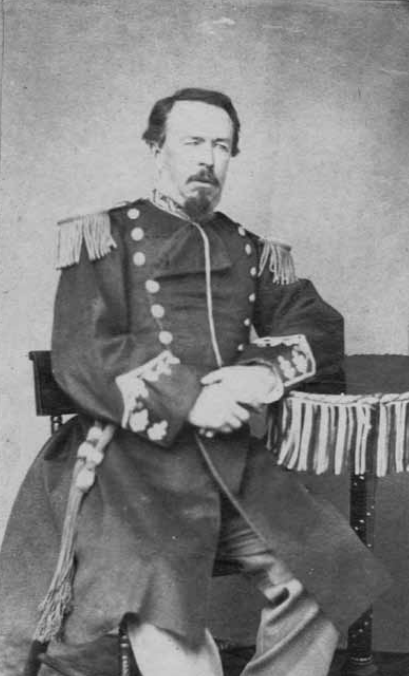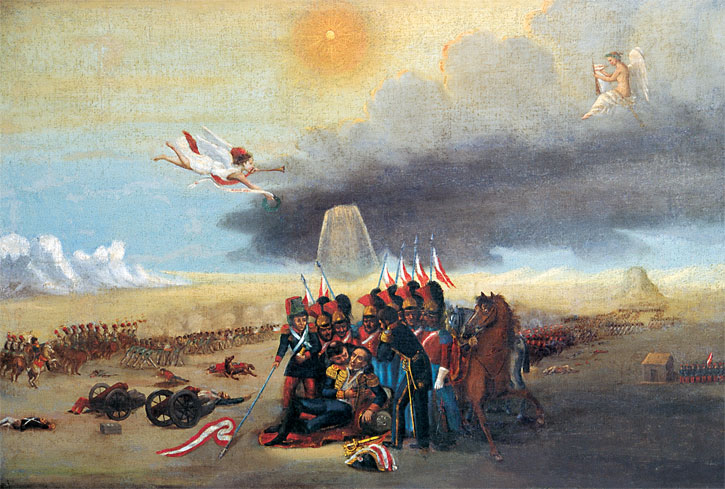|
José María Calderón
José María Calderón (12 October 1820 – 18 October 1872), also known as el Cachorro, was a Bolivians, Bolivian Military Officer, military officer. Known to be brave in the battlefield, he rose through the ranks and eventually aligned himself with the dictatorship of Mariano Melgarejo. José María de Achá would sentence Calderón to death in 1861. In order to avoid the sentence, Calderón fled to the Bolivian interior where he spent years in the Llanos de Moxos. Early life He was born in La Paz to Daniel Calderón Rada and Eulalia Roberta Bittencourt Jones. His father was a wealthy landowner, son of Felipe Calderón de la Barca Lopetegui and Fernanda Josefina Rada Guzmán de Mendoza y Rivero. In the Bolivian Army Calderón started his classes in the Military College of La Paz when he was 18 years old. However, while he was still training to become a military officer, the Peruvian–Bolivian War of 1841–42 erupted. Spearheaded by the efforts of Agustín Gamarra, Bolivia ... [...More Info...] [...Related Items...] OR: [Wikipedia] [Google] [Baidu] |
La Paz
La Paz (), officially known as Nuestra Señora de La Paz (Spanish pronunciation: ), is the seat of government of the Bolivia, Plurinational State of Bolivia. With an estimated 816,044 residents as of 2020, La Paz is the List of Bolivian cities by population, third-most populous city in Bolivia. Its metropolitan area, which is formed by La Paz, El Alto, Achocalla Municipality, Achocalla, Viacha Municipality, Viacha, and Mecapaca Municipality, Mecapaca makes up the second most populous urban area in Bolivia, with a population of 2.0 million, after Santa Cruz de la Sierra with a population of 2.3 million. It is also the capital of the La Paz Department, Bolivia, La Paz Department. The city, in west-central Bolivia southeast of Lake Titicaca, is set in a canyon created by the Choqueyapu River. It is in a bowl-like depression, part of the Amazon basin, surrounded by the high mountains of the Altiplano. Overlooking the city is the towering, triple-peaked Illimani. Its peak ... [...More Info...] [...Related Items...] OR: [Wikipedia] [Google] [Baidu] |
Eusebio Guilarte
Eusebio Guilarte Mole (15 October 1805 – 11 June 1849) was a Bolivian military officer and statesman who served as the tenth president of Bolivia from 1847 to 1848. Biography A career military officer (not an uncommon choice at the time), Guilarte had fought under Andrés de Santa Cruz at Zepita, and also in the battles of the War of the Confederation (Yanacocha and Uchumayo, among others). He had been José Ballivián's deputy aide at the Battle of Ingavi, for which he was rewarded as Ambassador to Brazil. Later, the President recalled Guilarte and appointed him a member of the powerful Council of State. Unable to sustain himself in power, in light of the vast conspiracies of Manuel Belzu, Ballivián chose to leave the country and, in late 1847, turned over power to General Guilarte. President As head of the Council of State, Guilarte succeeded Ballivián. By then the die was cast, as Belzu and his supporters were closing in on the capital. Guilarte's investiture sim ... [...More Info...] [...Related Items...] OR: [Wikipedia] [Google] [Baidu] |
Bolivian Military Personnel
Bolivian may refer to: * Something of, or related to Bolivia ** Bolivian people ** Demographics of Bolivia ** Culture of Bolivia * SS ''Bolivian'', a British-built standard cargo ship A cargo ship or freighter is a merchant ship that carries cargo, goods, and materials from one port to another. Thousands of cargo carriers ply the world's seas and oceans each year, handling the bulk of international trade. Cargo ships are usu ... {{disambig ... [...More Info...] [...Related Items...] OR: [Wikipedia] [Google] [Baidu] |
Brigadier General
Brigadier general or Brigade general is a military rank used in many countries. It is the lowest ranking general officer in some countries. The rank is usually above a colonel, and below a major general or divisional general. When appointed to a field command, a brigadier general is typically in command of a brigade consisting of around 4,000 troops (four battalions). Variants Brigadier general Brigadier general (Brig. Gen.) is a military rank used in many countries. It is the lowest ranking general officer in some countries, usually sitting between the ranks of colonel and major general. When appointed to a field command, a brigadier general is typically in command of a brigade consisting of around 4,000 troops (four battalions). In some countries, this rank is given the name of ''brigadier'', which is usually equivalent to ''brigadier general'' in the armies of nations that use the rank. The rank can be traced back to the militaries of Europe where a "brigadier general ... [...More Info...] [...Related Items...] OR: [Wikipedia] [Google] [Baidu] |
Nicanor Flores
Nicanor Flores (29 January 1820 – 14 July 1892) was an Argentine-born Bolivian military officer who rose to prominence during the presidency of José María Linares. Starting his military career during the Peruvian-Bolivian War of 1841-1842, he fought valiantly at the Battle of Ingavi, and also played a role during the War of the Pacific. He was married to the daughter of Pantaleón Dalence. Early life and military career Beginnings Born in Buenos Aires, Argentina, on January 29, 1820, he was the son of Francisco de Paula Flores and Josefa Luisa Velasco. His father was appointed chief magistrate of Salta in 1825, prompting the family to move to that city. Although his parents had planned for him to be a lawyer, Flores escaped to Bolivia in 1841. At the time of his arrival, Peru had launched an invasion of Bolivia. Determined to become a soldier, he entered the army as a second lieutenant of Infantry in the 8th battalion, heroically fighting at the Battle of Ingavi, whe ... [...More Info...] [...Related Items...] OR: [Wikipedia] [Google] [Baidu] |
Ildefonso Sanjinés
Ildefonso Sanjinés Rada (12 June 1812 – 2 December 1882) was a Bolivian military officer who served as Minister of War twice during the presidencies of Agustín Morales, Tomás Frías, and Adolfo Ballivián. Sanjinés served during the War of the Confederation and the Peruvian-Bolivian War of 1841-1842, fighting valiantly during the Battle of Ingavi. Early life He was born in the city of La Paz in 1812, the son of José Mariano Calderón de la Barca Sanjinés and Petrona de Rada. He entered the army as a cadet in the 10th battalion of the ''Guardia'' at the age of fourteen. In December 1831, he was promoted to second lieutenant and took part in almost all the battles of the War of the Confederation. Military career At the battle of Yanacocha, he fought heroically at the head of a company, earning him the rank of captain. Having been a part of the battles of Socabaya, Iruya, and Montenegro, he eventually reached the rank of lieutenant colonel. However, where Sanjinés ... [...More Info...] [...Related Items...] OR: [Wikipedia] [Google] [Baidu] |
Casto Arguedas
Casto Arguedas (23 April 1820 – 4 March 1888) was a Bolivians, Bolivian Officer (armed forces), military officer who held the position of Commander in Chief of the Bolivian Army on two occasions in 1879 and between 1885 and 1887. He was a prominent political figure of his time and was at the helm of the Constitutionalist Revolution of 1865–1866, which attempted to overthrow Mariano Melgarejo. Military career In 1841, Arguedas was going to finish his university studies when the Peruvian-Bolivian War of 1841-1842, second Peruvian invasion of Bolivia took place. It was then that all able bodied men throughout the entirety of Bolivia had to take up arms to defend their country, and Arguedas was among them. Incorporated into the ''Carabineros'' battalion as a cadet, he soon demonstrated his military aptitudes and excellent leadership skills, qualities with which he was able to win the appreciation and esteem of his superiors who began to look at him with deference. When the Battl ... [...More Info...] [...Related Items...] OR: [Wikipedia] [Google] [Baidu] |




